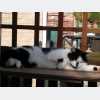| Profile | Posted by | Options | Post Date |

|
Len of the Chilterns
|
Report
|
13 Jan 2010 22:20 |
|
Mac
I always fancied having a go with a Bofors, presumably something like the Oerlikon. A nice, satisfactory thump, thump, thump and not so much humping shells about.
Len
|

|
MacTheOldGeezer
|
Report
|
12 Jan 2010 20:59 |
|
Len
When we were on the ranges in the middle 50's and when my secondary job was humping 40mm Oelikon Shells on the Illustrious during firing practice at drogues towed by Meteor Aircraft
We had ear defenders.............Little bits of cotton wool in our ears !!
Mac
|

|
Len of the Chilterns
|
Report
|
12 Jan 2010 17:13 |
|
I was called up for military service in 1942, shortly after my 18th birthday. Many of my school friends likewise went into the forces.
I didn't particularly want to go having only just started work and wanting to get on with my career. Having been given the option I asked for the navy and naturally was directed to an infantry regiment and during training found it quite an exciting (boring at times) life. I enjoyed unarmed-combat sessions (makes judo seem very ladylike) and the firing, stripping and re-assembly of various weapons. Stripping and re-assembling a Bren gun took 25 minutes. It was good fun on the firing ranges too where we used all sorts of small arms, mortars and grenades. Square-bashing was a bit of a bore but had its uses. I guess it built our characters. My abiding memory of the initial few months of training is of assault courses. I and many others never completed the earlier ones but were collected, exhausted, at various stages along the 5-mile course and transported back to our billets in the back of a Bedford 3-tonner (the first motor vehicle I learned to drive). I cannot recall any other time in my life being so flaked-out and, on the first occasion, collapsed on my bunk and slept with my boots on. On my first leave I checked to see how much weight I had lost and found it had increased by about 10lb
The first deaths I witnessed during the war were not due to enemy action but accident. The first was during an exercise. A dispatch rider cut in front of our truck, came off his motor bike and had his head run over. The next was during an air-raid over southern England. On recoil, the breech-block broke off our gun and knocked a chunk out of the concrete emplacement. No 5, the rammer, was standing in its path. There were plenty of deaths from enemy action later and what I mostly remember is the appalling smell that arises from freshly shredded bodies.
I suppose it was fortunate for me that at the time they were short of anti-aircraft gunners so had the opportunity to transfer to an artillery regiment. And found myself part of team manning a 3.7” heavy anti-aircraft gun and twin Lewis machine guns - the latter later to be replaced by Bren guns. It took 10 men to man a 3.7” AA gun (which weighed about 10 tons) and the Lewis all of which in an emplacement surrounded by thick concrete walls .There were 8 gun emplacements on the site. When all were in action, the noise was indescribable and we had no ear protectors in those days. Each gun could put up 6 shells a minute and we could keep going for about 15 or 20 minutes. A shell and case weighed about 25k or 56lb so the loaders, rammer and the men who shifted them from the magazine to the guns needed to be robust. The 3.7” referred to the bore of the gun barrel which, as far as I remember was 20ft long and had to be cleaned after an action. Sometimes we were strafed by low-flying enemy aircraft which was when our machine guns came in handy.
I said “fortunate” to be transferred to the HAA as several of my friends, some of them from schooldays, who were in other branches of the services, were sent overseas and died there. My particular pal, Tony (we were at school together) was a tail-gunner in a Lancaster. He survived the war but as an alcoholic - and subsequently died of cirrhosis of the liver. When he was called up he was a happy-go-lucky tee-totaller.
My two brothers also survived the war. Both older than me; one an officer in the navy and the other a medic in the air force. The former was on a cruiser and helped sink the French navy at Dakar whilst the other told me that sometimes they removed casualties from returning bombers with a hose, particularly “tail-end Charlies”. Les & Roy, my brothers, both died at 83 though 5 years apart.. I am now pushing 86 and, generally, choose to remember the best bits.
|

|
~Lynda~
|
Report
|
10 Jan 2010 20:12 |
|
I often wondered the same thing Sylvia :)))))
|

|
Redrobin
|
Report
|
10 Jan 2010 19:56 |
|
It has taken me most of the weekend to read this thread and although I was born after the war, it certainly explains a lot about my parents habits.
I have really enjoyed it and there are lots of thins you have mentioned and I hear myself saying ' oh , mum did that '.
What I would like to know is, When things fell off the BACK OF A LORRY. how comes they never got broken?
Dad never did answer that one, just gave me THE LOOK!!!
|

|
MacTheOldGeezer
|
Report
|
10 Jan 2010 19:53 |
|
I had to walk (from the age of 6, 1942) one and a half miles to school Come Rain, Shine, SNOW or Air Raids
When it was very cold we had to wrap up as best we could in the classrooms (What Central Heating ??)
Everyone in those days used to clear the footpaths outside their house and even did them for the Elderly in the Street as well
In the middle 50's If there was snow on my Christmas leave from the Navy i used to work the first week casual labour with the Council clearing snow off the footpaths, I got a fantastic £10 for the week (which was above the average wage then) , My pay in the Navy ??? £1.75 a week
That week made me a rich man and the second week of my leave I could afford anything I wanted
Mac
|

|
***Julie*Ann***.sprinkling fairydust***
|
Report
|
10 Jan 2010 15:33 |
|
i wasnt born until 64, however,
i said to someone other day how is it years ago people got together and cleared streets, pavements,
you never had this hassle then, no one moaned omg how we gona get out,
you use your feet,
if it too far you stay home,
blimey
even 22 year ago in germany, i member hubby had to clear path outside flat with other guys,
and we had to keep pavements clear,
main pavements you couldnt get buggy thru, but you jsut managed
|

|
Jilliflower
|
Report
|
10 Jan 2010 15:26 |
|
I've really enjoyed reading this thread as it caused my OH and I to remember a lot of things about the war years.
As a small child I vividly remember my Bo ~Peep dressing gown with a four inch hem - my mum bought lots of things when the war started so that we wouldn't run out! - and I went to bed in it every night so that I could be carried down to the Anderson shelter.
My dad was in the RAF so I slept in with my mum. One morning she woke delirious so I ran up the avenue to my nan's just after dawn to try and wake them for help. Mum had diphtheria and I didn't see her for 12 months.
A bomb wiped out four houses at the bottom of our avenue so the four women inthe house took me away into the country away from Birmingham Blitz.
THe Salvation army put us up for a night then we stayed on a farm where I discovered where eggs came from as we collected them each day from the hedges on the farm.
One day aunty Grace sat me on the farm gate and instructed me what to say to the two men in grey who were coming up the lane. I looked very like SHirley Temple with my ringlets and my cute cry of "Got any gum chum" brought smiles from the Yanks who were stateioned up the road.
The next day they brought me a banana which I had never seen before and didn't know what to do with.
do keep this thread going!
Jill
|

|
Jean (Monmouth)
|
Report
|
9 Jan 2010 19:28 |
|
The country schools stayed open and we got there as long as the bus could run. Roads were cleared by whoever was available, and buses ran as normal. It was difficult walking the 2 miles from the bus stop, carrying shopping and babies, but it was done. No one had cars as petrol was reserved for essential users. We melted snow for washing as it was lovely and soft. The farmer near us used his carthorse to take feed out to the stock.
|

|
Mazfromnorf
|
Report
|
9 Jan 2010 16:51 |
|
what happened in the war time winters did all grind to a halt like this how did you all manage ?
|

|
☼ Pam ☼
|
Report
|
9 Jan 2010 15:17 |
|
Nudge.
|

|
☼ Pam ☼
|
Report
|
5 Jan 2010 20:28 |
|
nudge
|

|
MacTheOldGeezer
|
Report
|
2 Jan 2010 20:27 |
|
Hear, Hear !!
|

|
☼ Pam ☼
|
Report
|
2 Jan 2010 20:23 |
|
A well overdue nudge!!
|

|
Jean (Monmouth)
|
Report
|
12 Dec 2009 19:30 |
|
Boo to you, too!
Seriously, try and keep this nudged as there will be newbys who havent seen it and may know nothing of the things we mention.
|

|
MacTheOldGeezer
|
Report
|
12 Dec 2009 17:40 |
|
Boo !!
|

|
~Lynda~
|
Report
|
17 Nov 2009 20:25 |
|
My last nudge for a while, my membership runs out tonight, and I'm not renewing for a while. I hope people will still add to this thread, and that those who are interested in war memories, give it a nudge now and again so more memories can be added.
Thanks:))))
|

|
☼ Pam ☼
|
Report
|
8 Nov 2009 18:54 |
|
More young men still being lost to war. Lest we forget.
Nudge
|

|
~Lynda~
|
Report
|
8 Nov 2009 18:16 |
|
Nudge for a special day
|

|
Joy
|
Report
|
3 Nov 2009 22:31 |
|
http://www.passingofthegeneration.org.uk/
At the 11th hour, on the 11th day, of the 11th month of 1918, the Armistice, that was concluded between Germany and the Allies, and which was to bring to an end the hostilities that had involved millions of people from countries across the world, came into effect. The First World War had lasted four years, four months and 14 days.
To mark the passing of the World War One (WW1) generation that lived during this period, a national event will take place at Westminster Abbey on Remembrance Day, Wednesday 11 November 2009.
|

